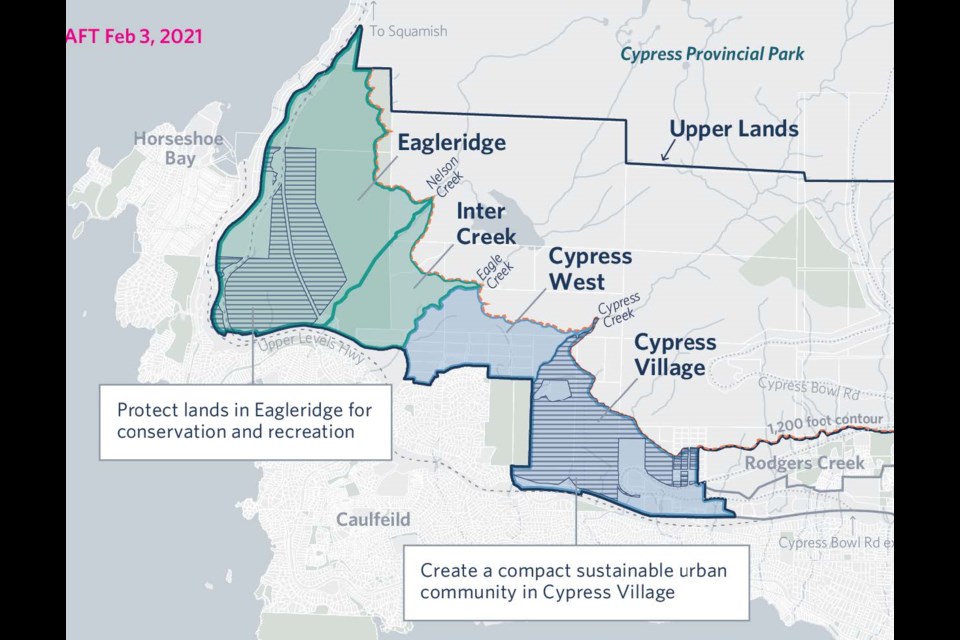After more than three hours of discussion and public input, the District of West Vancouver unanimously green lit the "compact and sustainable" Upper Lands development proposal to move into the next stage.
Meeting on Monday, the district passed Phase 2 of the development proposal for Cypress Village that would in turn ensure the protection of 280 acres of Eagleridge lands from residential development by British Pacific Properties.
The passing of this phase means district staff will enter into Phase 3 of the development plan, where further refinement by staff and consultation with stakeholders and the public will occur.
The proposal sees Cypress Village developed into a dense, walkable community with a mix of 3,700 market and affordable housing units by 2045. The development will have its own commercial centre so residents won't need to drive elsewhere in the municipality to access shops, services and work.
In 1931, West Vancouver residents voted 1,329 to 26 in favour of selling most of the Upper Lands to British Pacific Properties. The arrangement included cash and payment of taxes for the lands, as well as commitments related to public infrastructure improvements, according to the district. Most of the land between the Capilano River and the Sea to Sky Highway is already zoned for single-family homes but has never been developed.
Director of planning Jim Bailey and project co-manager Nicole Olenick said Phase 2 did not consider a “do nothing approach” or an approach to maintain the current planning “status quo.”
“Over the long term, this vision … will protect a very large natural area for recreation and conservation. It'll help limit suburban sprawl, and it will concentrate development in a more compact and sustainable way,” Olenick said.
Staff anticipate around 6,900 people will reside in Cypress Village once the development has been completed, although it will be a phased approach with around 200 people living there in 2025.
Coun. Craig Cameron made specific note of the importance of the development proposal working to conserve Eagleridge Bluffs.
“This is an incredibly special place. It's a gem. Every time I go up there, I can't believe what a place it is,” he said, adding that he is committed to doing “what is necessary” to protect Eagleridge Bluffs.
In response to West Vancouver resident and public speaker Michael Markwick, Cameron also made note that BPP continuing to build single-family homes is not an exercise in climate justice or housing justice.
“Building a huge 15,000-square-foot mansion is nobody's idea of a climate solution. And sprawling suburbs cost a heck of a lot for the city,” he said. “They're not efficient, and they would result in the loss of gigantic amount of green space. Whereas compact communities, smaller units, built in denser forms are much more economical to service and more efficient to heat. And they allow people to live in a 15-minute neighbourhood.”
However, the passing of Phase 2 did not come without concerns. Some council members and members of the public scrutinized portions of the proposal, including the height of some condo buildings, the potential for increased traffic along Cypress Bowl Road, accessible transit concerns, and the lack of a guarantee by BPP to not develop its lands in the future above 1,200 feet.
Coun. Sharon Thompson specifically expressed her disappointment around the density of the proposed development, noting that when initially presented with the idea of the development around a decade ago, she thought it would be a wonderful addition to West Vancouver.
“The density transfer is a shocker to me. It just feels uncomfortable. … I've for years conceptualized it as a Whistler-style village, where you don't have the presence of high towers, like 22-storey towers. It just has a very different feel. I would be lying if I say it didn't disappoint me in some way,” she said.
Staff expect Phase 3 to be completed by the second quarter of 2022.



